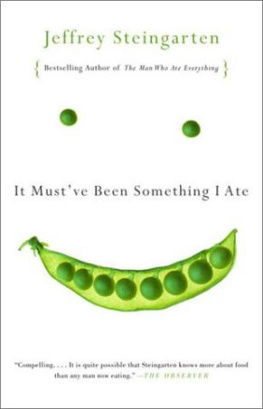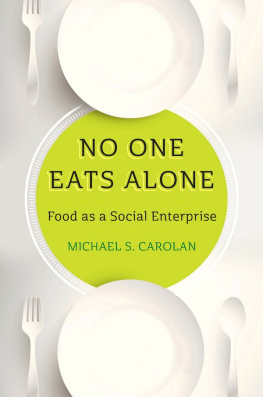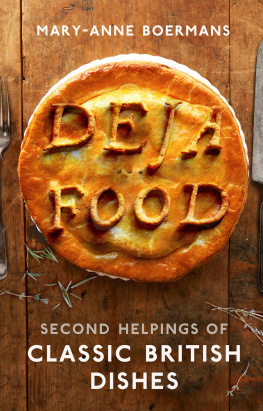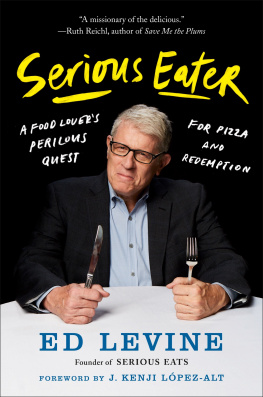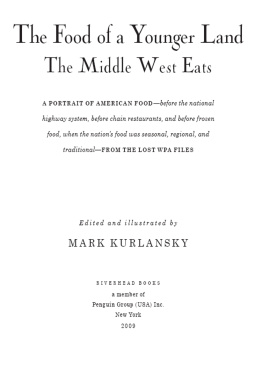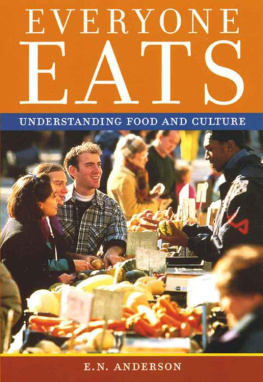FIRST VINTAGE BOOKS EDITION, OCTOBER 2003
Copyright 2002 by Jeffrey Steingarten
All rights reserved under International and Pan-American Copyright Conventions. Published in the United States by Vintage Books, a division of Random House, Inc., New York, and simultaneously in Canada by Random House of Canada Limited, Toronto. Originally published in hardcover in the United States by Alfred A. Knopf, a division of Random House, Inc., New York, in 2002.
Vintage and colophon are registered trademarks of Random House, Inc.
The pieces in this collection first appeared, in somewhat different form, in Vogue .
The Library of Congress has cataloged the Knopf edition as follows:
It must've been something I ate : the return of the man who ate everything /
by Jeffrey Steingarten.
p. cm.
Includes index.
ISBN 0-375-41280-8
1. Gastronomyhumor. 2. Foodhumor. I. Title.
TX631 .S72 2002
641.0130207dc21 2002024676
Vintage ISBN: 0-375-72712-4
Author photograph Hiro
www.vintagebooks.com
v3.0
It Must've Been Something I Ate Acclaim for JEFFREY STEINGARTEN's Armed with a sense of adventure, a spymaster's array of fancy gadgets, and a mind that finds it natural to introduce Boccaccio into a disucssion of Parmesan cheese, he turns out little thrillers on the riddles of salt and the making of perfect pizza, salutes to chocolate and goose. Steingarten asserts that eaters ask modern cooking to be stunning, original, precise, provocative, and very delicious, and his best prose displays those very qualities. Entertainment Weekly Like the best food, nourishes and delights. The Boston Globe Endlessly entertaining and thought-provoking Steingarten moves with boundless authority and wit between the search for a perfect espresso and investigations into why the Chinese don't all have MSG-induced headaches and whether different types of salt have different flavours. This is food-writing at its succulent best. The Sunday Times (London) The tireless culinary connoisseur is back in full force. And somehow, during all his pursuits, he manages to remain an entirely likeable food snobmainly because he's funny, even self-deprecating. Time Out New York A witty, humorous culinary road trip, even for those with a lesser interest in food. For serious gourmets and gourmands, it is a road trip not to be missed. Read it with a food you love. Fort Worth Star-Telegram Steingarten may be our most original investigative food writer. William Rice, Chicago Tribune Erudition, sense of humour, graceful prose, fanatical gluttony[Steingarten]'s got it all. The Guardian This is a gastronome who sifts the minutiae of science and culture with the big picture in sight and a warm wit always roiling just beneath the surface of his writing. The Atlanta Journal-Constitution So energetic, so informative, and so right in its central arguments. The Daily Telegraph (London) Steingarten remains a compulsively funny writer. Short of a food fight, this book is the best way to have fun with edibles. St. Louis Post-Dispatch Delectable. Steingarten's tools for creating delight are the same as the chefs and bakers and farmers, terrestrial and marine, whose work he celebrates. He has an intense and contagious pleasure in food. The San Diego Union-Tribune
JEFFREY STEINGARTEN
It Must've Been Something I Ate
Jeffrey Steingarten is Vogue's food critic and the author of The Man Who Ate Everything . He trained to be a food writer at Harvard Law School and on the Harvard Lampoon . On Bastille Day, 1994, the French Republic made Mr. Steingarten a Chevalier in the Order of Merit for his writings on French gastronomy. Chevalier Steingarten discloses that his preferred eating destinations are Memphis, Paris, Bangkok, Alba, and Chengduand his loft in New York City, where he has recently created well over a firkin of cultured butter.
Essays in this collection have won a National Magazine Award and several prizes from the James Beard Foundation and the International Association of Culinary Professionals. The Man Who Ate Everything was a New York Times bestseller and the winner of the Julia Child Cookbook Award and the Guild of British Food Writers' Prize for the year's best book about food.

ALSO BY JEFFREY STEINGARTEN
The Man Who Ate Everything
For Anna, Judith, and Sonny
Contents
THE WAY WE EAT NOW
Technically, it is known as the Calamari Index, or C.I., and it measures precisely how far we've come as a nation of eaters over the past 30 years. In the sixties and for most of the seventies, calamari consumption in this country was among the lowest in the world. (They were most popular in Cyprus, Japan, Korea, Spain, Greece, and Italy.) Very few Americans would go near a cuttlefish. Everything about them was repulsive. My own Personal Calamari Index, or P.C.I., was truly pitiful as well.
And then, in the mid-eighties, the C.I. totally took off. Calamari began cropping up on every street corner in America. Raw fish would quickly follow. Today there is hardly a restaurant anywhere that doesn't offer fried, flavored, crispy calamari as an appetizer, paired with a themed dipping sauce. We love to munch on the multitude of crunchy little tentacles. We are amused to watch the curled rows of tiny suckers slide into our mouths. I have recently been eating bugs, as well. We'll get to that in a minute.
Thus, by graphing the weight of calamari the average American man, woman, and child consumes each year, we obtain an exact yet simple indicator of how completely we have overcome our inbred revulsion toward certain foods and, whether yielding to social pressure or truly opening up and evolving as human beings, have learned to love them. In the interests of accuracy, we should call it the Cephalopod Index, or C.I., because official statistics from the Food and Agriculture Organization (FAO) of the United Nations combine cuttlefish with squid and octopus under the overarching category of cephalopods. According to the FAO, between the early sixties and today, U.S. cephalopod intake soared by 184 times!.
What better example can one imagine of the universal truth that no food is inherently revolting? Infants are not repulsed by the sight or smell of rotten meat crawling with maggots. Forty- two cultures around the world eat rats. And now, the creature that once inspired only nightmares to disrupt the Anglo-American sleep cycle has become commonplace.
What divine or cosmic force has wrought such a change? I would venture that at least half the credit is owed to the present author and his relentless international campaign to coax and, if necessary, humiliate people who hold on to phony allergies, bogus intolerances, nutritional nonsense, and provincial preferences. Once you master the chapter entitled Fear of Formaggio , you will surely understand. Sadly, I nearly meet my comeuppance in Taro, Taro, Taro.
As I related in the introduction to my first book, The Man Who Ate Everything , when I became Vogue's food critic, I felt an ethical responsibility to rid myself of every psychological and cultural prejudice and inhibition preventing me from becoming the perfect omnivore, the ideally neutral critic. Six heroic months later, I had reached my goal, with two exceptions. First, I had failed to shed my distaste for desserts in Indian restaurants. But as I feel I completely opened my heart to them, I refuse to blame myself for what others might perceive a monumental personal failure. And second, under the press of time, I had temporarily recused myself in the matter of bugs.
Though insects are crunchy, nutritious, high in protein, inexpensive, and easy to cook, most people I know in northern Europe and North America (excluding Mexico) avoid them. Elsewhere, people are especially fond of locusts, grasshoppers, crickets, termites, butterflies, beetles, and the larvae and pupae of large moths. In Presencia de la comida prehispnica , Teresa Yturbide reports that when the Spanish conquerors arrived in America, they found the Maya and Aztecs enjoying roasted corn worms, tacos stuffed with grilled toritos (avocado bugs), and the red and white worms that breed and live in the maguey plant. (To retain their fat, the red ones were first roasted over low heat, then crushed with roasted tomatillos and chiles, and eaten with blue- corn tortillas.) Plus, they ate jumil bugs, wood larvae, green worms, the pupae and eggs of the big-shoed wasp, honey ants, vine ants, ant eggs, sage worms, and sun-dried chia worms, which are as long as your hand and have tentacles on their heads.
Next page
